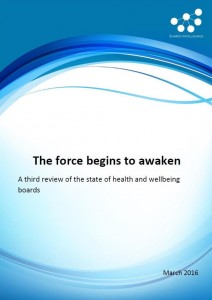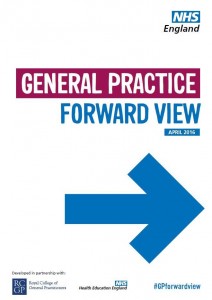Adaptation is an essential characteristic of evolution. Without it, survival becomes difficult when conditions change. It’s an analogy worth applying to Health and Wellbeing Boards (HWBs) who have demonstrated an ability to flex and redefine their role over three years of official existence. I say this in recognition of the fact that sector expectations today are quite different – and arguably more stretching - than the environment in which HWBs were born.
Four years ago, their core purpose was set out thus: ‘Health and wellbeing boards are fora where leaders from the health and care system work together to improve the health and wellbeing of their local population and reduce health inequalities. Members collaborate to understand their local community’s needs, agree priorities and encourage commissioners to work in a more joined up way.’
 Now, HWBs find themselves operating in an increasingly complex world of continued fiscal restraint, integration, devolution, seven day service delivery, and new sustainability and transformation plans - often being pursued on a larger geographical footprint. Their role as coordinators at the local level of agreement, action and delivery between local authorities, health and care providers has never been more vital.
Now, HWBs find themselves operating in an increasingly complex world of continued fiscal restraint, integration, devolution, seven day service delivery, and new sustainability and transformation plans - often being pursued on a larger geographical footprint. Their role as coordinators at the local level of agreement, action and delivery between local authorities, health and care providers has never been more vital.
It’s reassuring, therefore, that the latest Shared Intelligence report into HWB performance, with a title riffing on a certain re-energised film franchise, ‘The force begins to awaken’, has this to say:
A significant number of health and wellbeing boards are beginning to play a genuine leadership role across local health and care systems. Our work suggests these boards are considerably more effective than they were a year ago.
It’s also heartening to note that, even where local relationships and joint working are not as strong as they could be, none the less, HWBs seem to be one of the few places where attempts at closer collaboration can be expected to have a reasonable chance of success.
So what is driving this step up in performance? Shared Intelligence identifies these factors:
- Committed leaders
- Clarity of purpose, being clear about the primary task of the board
- The response to austerity, which can drive collaboration or a retreat into silos
- A focus on local priorities to drive collaboration
- A director of public health who ‘gets it’
- Getting the basics right, enabling effective systems leadership
Shared leadership between health and local government has also been cited as the measure of a successful board. The report reveals that many HWBs have appointed CCG members as vice chairs. Meanwhile, a growing number of local authority and CCG co-chairs is indicative of closer ties between the two organisations.
So, I think we can say with some confidence that most HWBs are rising to the challenges before them, facilitating and nurturing relationships between commissioners and providers, whilst paying due care and attention to transparency and accountability. We continue to rely on them to honour and service local priorities and share progress and setbacks honestly within their constituencies. Complex geographies and legacies of poor relationships may dog some boards but we will continue to work with the LGA, NHS and local councils to resolve or mitigate these issues.
What is unquestionable is that further need for adaptation and evolution lies ahead. Increasingly, we need HWBs to be asking the hard questions about what needs to change in their local health and care system to enable delivery of their Health and Wellbeing Strategies. Without this deep engagement with the design and functioning of the local system, there is a danger that their work will become something of an ox-bow lake, with the main stream of transformational activity passing them by. That would not only be damaging for HWBs, it would quickly become problematic, in terms of making necessary change happen; for example, if the various NHS transformation programmes were to become disconnected from the instruments of local democracy.
 There are some specific challenges that will test HWBs’ ability to step up to the plate over the next few months. One will be to develop the local policy framework needed to meet the Government’s Spending Review commitment of pursuing full integration of health and care by 2020.
There are some specific challenges that will test HWBs’ ability to step up to the plate over the next few months. One will be to develop the local policy framework needed to meet the Government’s Spending Review commitment of pursuing full integration of health and care by 2020.
A second is to respond to the challenge of the Mental Health Task Force report with coherent local strategies that will result in a step up in service access and quality. And critically, many HWBs are working through their relationship with the STP development process, working out what is best pursued at the STP geographical footprint and what is best done at locality level.
The very latest test of this leadership challenge to HWBs comes in the form of the recently published General Practice Forward View which sets out a multi-billion plan designed to re-energise general practice, improve patient care and access, and invest in new ways of providing primary care.
The Department of Health will be issuing guidance to HWBs asking them to make sure joint health and wellbeing strategies include collaboration across health, social care, public health and wider services to build strong and effective relationships with GP services.
By definition general practice already has a strong community base. The strengthening of relationships and ways of working between primary care, statutory and voluntary services, will give them even greater awareness and influence over the health and care needs of their local populations. Primary care is not only the bedrock of the NHS but for many people their most significant relationship with local public services. We need local authorities in particular to make much more explicit their recognition of GP’s primary role, (the clue’s in the name!) and make sure they have access to the broader social services they need to be able to do their job properly.
So three years on from their inception, HWBs can look back with pride on what they’ve achieved, but now need to push on into new territory. May that essential force of local democratic authority be with them!
